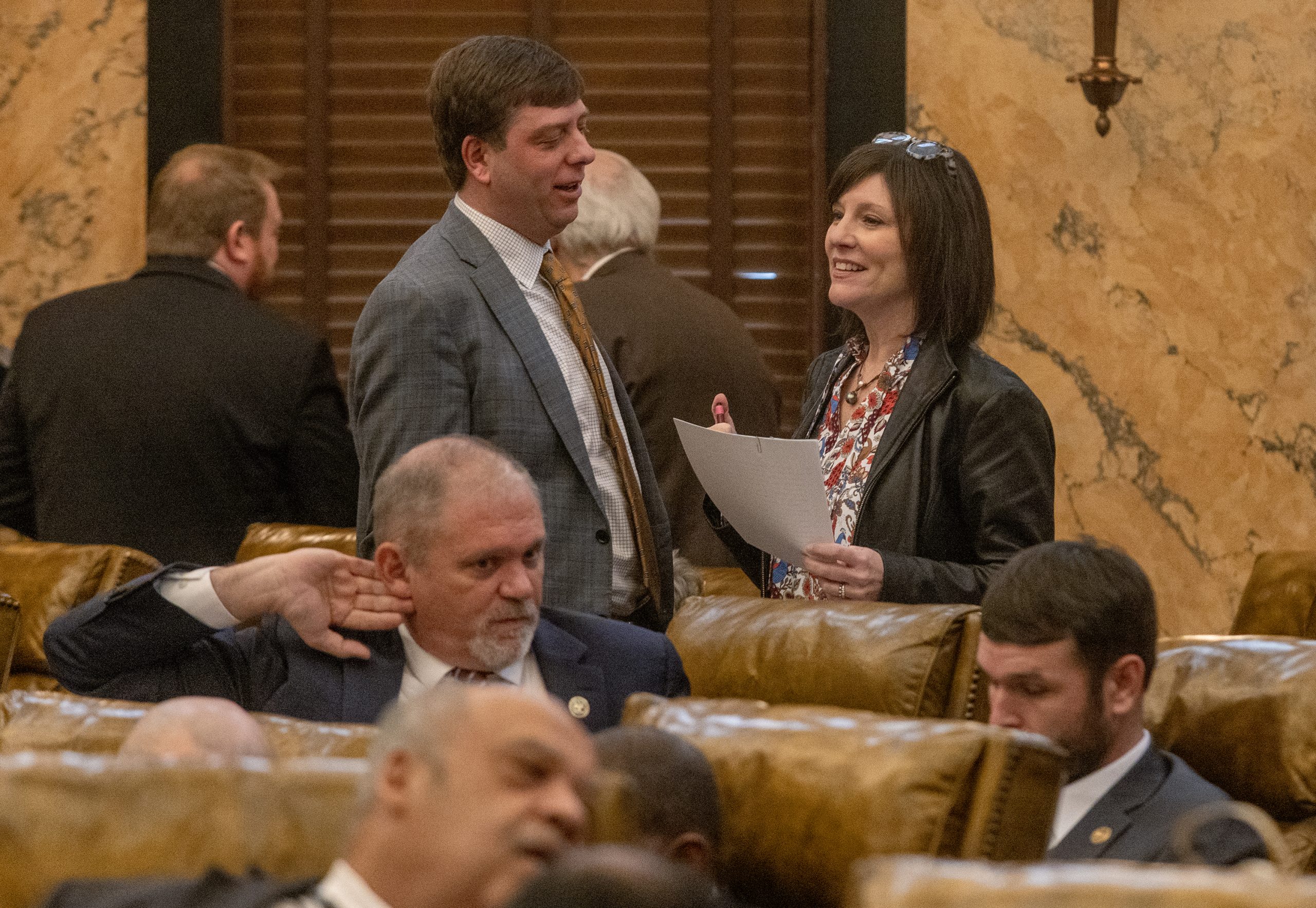Mississippi Today
New legislative leadership: Nothing off table in tackling Mississippi health issues

Last year, committee chairs in the House and Senate killed every Medicaid expansion bill without a debate or vote.
Now, for the first time in a decade, a policy that has been politically forbidden in Mississippi will at least get a full hearing.
That’s because of pivotal changes in House leadership. Newly elected Speaker Jason White appointed Missy McGee, R-Hattiesburg, to chair the Medicaid Committee, and Sam Creekmore IV, R-New Albany, to chair the Public Health and Human Services Committee.
McGee has been a vocal proponent of postpartum coverage, which passed last year, and presumptive eligibility for pregnant women – which did not. Creekmore, along with Rep. Kevin Felsher, R-Biloxi, successfully passed legislation last year to improve mental health services in the state.
Both say that this year, nothing is off the table. And while leadership on the Senate side of Public Health and Medicaid remains the same, committee chairs there have voiced support of increasing health care coverage and reform.
“I do think it could definitely be a historic year for the state of Mississippi,” McGee said, “in that we have talked a lot about providing health care to low-income workers.”
McGee and Creekmore have also been diligent about reframing the narrative around expansion to make it clear that the increased coverage they support is not welfare and it’s not a handout – it’s health care coverage for low-income, working-class Mississippians.
“And we don’t really know what that’s going to look like right now,” McGee said, “but it has been something that the majority of Mississippians really support. I’m looking forward to coming up with sound policy that would provide this option for hardworking Mississippians who can’t afford health care – whether their employers don’t offer it, or whether they simply can’t afford to purchase it.”
McGee said she is also looking forward to reintroducing her presumptive eligibility bill – which would allow pregnant women to be presumed eligible for Medicaid and receive timely prenatal care. House Bill 539 was assigned to committee this week.
“We know that with a lot of women who are eligible for Medicaid, it often takes quite a while before they are able to get on their Medicaid benefits – and sometimes it can be beyond the first trimester,” she said.
McGee says she has confidence presumptive eligibility will pass this year, and will help move Mississippi off the top of the list for infant and maternal mortality – which she says is her goal for the term.
“I just feel like it’s got a lot more momentum this year than it has in years past,” she said.
Creekmore said he was surprised at his appointment to chair the Public Health Committee, and he did not ask for it – though it was his first choice.
Creekmore, who comes from a family of health care workers, said health care has always been “near and dear” to him. He remembers, growing up, the phone would sometimes ring in the middle of the night and he would wake up his father to attend a delivery.
“He’s a hometown doctor and he’s my hero,” Creekmore said about his father.
Last year, Creekmore authored House Bill 1222 – which provides mental health training for law enforcement and helps families dealing with the court systems. It passed unanimously.
“My first four years, for whatever reason, the Lord has led leadership to put me into the mental health realm, and we’ve made some great strides,” Creekmore said. “I want to continue to do that, and I just thought I would be more effective in Public Health.”
In the Senate, Kevin Blackwell, R-Southaven, is introducing a presumptive eligibility bill similar to McGee’s.
In addition to two presumptive eligibility bills coming from both the House and Senate, Blackwell said, “we’ll also probably have it added to the tech bill. It’s a serious issue for a lot of us on this side.”
The Medicaid technical bill is a notoriously complicated bill with a lot of jargon that outlines the function and scope of Medicaid, and which must be renewed every three years. This year, it’s up for renewal.
The tech bill could be a way to pass presumptive eligibility for pregnant women or Medicaid expansion – if separate bills on those fronts aren’t successfully passed. The tech bill usually bounces back and forth between the chambers, and involves concessions on both sides, since, unlike other bills, the tech bill must be renewed for the program to operate.
Aside from presumptive eligibility, Blackwell also filed Senate Bill 2080, on professional midwifery, and Senate Bill 2079 on nurse-practitioner collaboration agreements.
The midwifery bill would look at establishing a formal licensed midwifery program in the state – the first of its kind.
Midwifery is currently not regulated in Mississippi, meaning anyone can practice without formal training or certification. Midwives who want to undergo a certification program end up going out of state – and sometimes don’t return.
In a state riddled with maternity care deserts, losing providers to neighboring states because they are offering a service Mississippi could easily offer just doesn’t make sense, Blackwell explained.
Midwifery, he says, is an obvious solution for non-complicated, low-risk births, since “women have been helping women have babies since our primitive days.”
Senate Bill 2079 seeks to abolish restrictive collaboration agreements between nurse practitioners and physicians.
These agreements are expensive and limit the freedom with which nurse practitioners can operate. They usually have distance limitations, as well, placing restrictions on how far from their collaborating physicians nurse practitioners can practice. Since most physicians operate in urban areas, that means nurse practitioners can’t provide care to the rural communities that desperately need it.
“All it is is a paid relationship and it needs to go away,” Blackwell said. “Nurse practitioners aren’t killing folks, they’re not doing major surgeries, open heart surgeries. They’re practicing within the confines of their license and given our need to have access to health care, why would we not do this?”
Blackwell has filed similar bills in past years, but they all died in committee.
Like Blackwell in Medicaid, Hob Bryan, D-Amory – the longest-serving state senator – is continuing to chair Public Health.
Bryan said he is excited to be “on the horizon of a new four-year term,” although, he joked, he might not make it that long – a nod to the presentation State Health Officer Dr. Daniel Edney gave to the Senate Public Health Committee last Wednesday.
In it, Edney had stressed the urgency of several public health metrics and had said to Bryan “I don’t think I’m the oldest one in this room, no offense Mr. Chairman, the life expectancy is 71,” – the lowest in the country.
“These are real numbers that impact real Mississippians,” Edney said. “We have the highest rate of preventable deaths. That means more Mississippians die unnecessarily every year than anywhere else in this country, and these problems have solutions. I trust your good judgment to get us where we need to be. And I want to help you with whatever data, information, resource you need.”
While it’s unclear whether Republicans who say they will consider Medicaid expansion will ultimately support it, Bryan has been more outspoken with his beliefs that the current system of coverage is not working for low-income working Mississippians.
Diabetes, according to Bryan, is a “maddening example” of a group of people who are ineligible for preventative care, and become eligible for health care only by the time they need to have limbs amputated.
“At which point, congratulations!” Bryan exclaimed. “Now you are disabled and you qualify for health care.”
Edney gave presentations to both the House and Senate Public Health committees during their first meetings of the session. Rep. McGee says her committee will be hearing from Drew Snyder, Mississippi Medicaid executive director, next week.
The deadline to file bills is Feb. 19, later than most years since the first session of a new term is 120 days, as opposed to the typical 90 days.
This article first appeared on Mississippi Today and is republished here under a Creative Commons license.![]()
Mississippi Today
Mississippi lawmakers end 2025 session unable to agree (or even meet about) state budget: Legislative recap
Infighting between Mississippi’s Republican House and Senate legislative leaders reached DEFCON 4 as the 2025 legislative session sputtered to a close last week.
Lawmakers gaveled out unable to set a $7 billion state budget — their main job — or to even agree to negotiate. Gov. Tate Reeves will force them back into session sometime before the end of the fiscal year June 30. At a press conference last week, the governor assured he would do so but did not give a timetable, other than saying he plans to give lawmakers some time to cool off.
The crowning achievement of the 2025 session was passage of a tax overhaul bill a majority of legislators accidentally voted for because of errors in its math. House leaders and the governor nevertheless celebrated passage of the measure, which will phase out the state individual income tax over about 14 years, more quickly trim the sales tax on some groceries to 5% raise the tax on gasoline by 9 cents a gallon, then have automatic gas tax increases thereafter based on the cost of road construction.
The error in the Senate bill accidentally removed safeguards that chamber’s leadership wanted to ensure the income tax would be phased out only if the state sees robust economic growth and controls spending.
The rope-a-dope the House used with the Senate errors to pass the measure also stripped a safeguard House leaders had wanted: a 1.5 cents on the dollar increase in the state’s sales tax, which would have brought it to 8.5%. House leaders said such an increase was needed to offset cutting more than $2 billion from the state’s $7 billion general fund revenue by eliminating the income tax, and to ensure local governments would be kept whole.
Reeves was nonplussed about the flaws in the bill he signed into law (at one point denying there were errors in it) and called it “One big, beautiful bill,” borrowing a phrase from President Donald Trump.
Quote of the Week
“Quite frankly, I think it’s chicken shit what they did.” — Gov. Tate Reeves, at a press conference last week when asked his thoughts about the Senate rejecting his nomination of Cory Custer, Reeves’ deputy chief of staff, to serve as four-year term on the board of Mississippi Public Broadcasting.
Full Legislative Coverage
What happened (or didn’t) in the rancorous 2025 Mississippi Legislative session?
Mississippi Today’s political team unpacks the just ended — for now — legislative session, that crashed at the end with GOP lawmakers unable to pass a budget after much infighting among Republican leaders. The crowning achievement of the session, a tax overhaul bill, was passed by accident and full of major errors and omissions. Listen to the podcast.
Gov. Tate Reeves, legislative leaders tout tax cut, but for some, it could be a tax increase
Many of those retirees who do not pay an income tax under state law and other Mississippians as well will face a tax increase under this newly passed legislation touted by Reeves and others. Read the column.
Trump administration slashes education funding. Mississippi leaders and schools panic
Mississippi schools and the state education system are set to lose over $137 million in federal funds after the U.S. Department of Education halted access to pandemic-era grant money, state leaders said this week. Read the story.
Gov. Tate Reeves says he’ll call Mississippi lawmakers back in special session after they failed to set budget
Gov. Tate Reeves on Thursday said he will call lawmakers into a special session to adopt a budget before state agencies run out of money later in the summer and hinted he might force legislators to consider other measures. Read the story.
GOP-controlled Senate rejects governor’s pick for public broadcasting board. Reeves calls it ‘chicken s–t’
The Senate on Wednesday roundly rejected the nomination of Cory Custer, Reeves’ deputy chief of staff, to serve a four-year term on the board of directors of Mississippi Public Broadcasting, the statewide public radio and television network. Reeves reacted to the Senate’s vote on Thursday, calling it “chicken shit.” Read the story.
Early voting proposal killed on last day of Mississippi legislative session
Mississippi will remain one of only three states without no-excuse early voting or no-excuse absentee voting. Read the story.
Mississippi Legislature ends 2025 session without setting a budget over GOP infighting
The House on Wednesday voted to end what had become a futile legislative session without passing a budget to fund state government, for the first time in 16 years. The Senate is expected to do the same on Thursday. Read the story.
Mississippi Legislature approves DEI ban after heated debate
Mississippi lawmakers have reached an agreement to ban diversity, equity and inclusion programs and a list of “divisive concepts” from public schools across the state education system, following the lead of numerous other Republican-controlled states and President Donald Trump’s administration. Read the story.
Fear and loathing: Legislative session crashes with lawmakers unable to set a budget because of Republican infighting
Republican Lt. Gov. Delbert Hosemann and other Senate leaders on Saturday excoriated the Republican House leadership, after the House didn’t show up for what was supposed to be “conference weekend” to haggle out a $7 billion budget. Read the story.
‘We’ll go another year’ without relief: Pharmacy benefit manager reform likely dead
Hotly contested legislation that aimed to increase the transparency and regulation of pharmacy benefit managers appeared dead in the water Tuesday after a lawmaker challenged the bill for a rule violation. Read the story.
This article first appeared on Mississippi Today and is republished here under a Creative Commons Attribution-NoDerivatives 4.0 International License.
The post Mississippi lawmakers end 2025 session unable to agree (or even meet about) state budget: Legislative recap appeared first on mississippitoday.org
Mississippi Today
On this day in 1909, Matthew Henson reached the North Pole
April 6, 1909

Matthew Henson reached the North Pole, planting the American flag. Traveling with the Admiral Peary Expedition, Henson reportedly reached the North Pole almost 45 minutes before Peary and the rest of the men.
“As I stood there on top of the world and I thought of the hundreds of men who had lost their lives in the effort to reach it, I felt profoundly grateful that I had the honor of representing my race,” he said.
While some would later dispute whether the expedition had actually reached the North Pole, Henson’s journey seems no less amazing.
Born in Maryland to sharecropping parents who survived attacks by the KKK, he grew up working, becoming a cabin boy and sailing around the world.
After returning, he became a salesman at a clothing store in Washington, D.C., where he waited on a customer named Robert Peary. Pearywas so impressed with Henson and his tales of the sea that he hired him as his personal valet.
Henson joined Peary on a trip to Nicaragua. Impressed with Henson’s seamanship, Peary made Henson his “first man” on the expeditions that followed to the Arctic. When the expedition returned, Peary drew praise from the world while Henson’s contributions were ignored.
Over time, his work came to be recognized. In 1937, he became the first African-American life member of The Explorers Club. Seven years later, he received the Peary Polar Expedition Medal and was received at the White House by President Truman and later President Eisenhower.
“There can be no vision to the (person) the horizon of whose vision is limited by the bounds of self,” he said. “But the great things of the world, the great accomplishments of the world, have been achieved by (people with) … high ideals and … great visions. The path is not easy, the climb is rugged and hard, but the glory at the end is worthwhile.”
Henson died in 1955, and his body was re-interred with full military honors at Arlington National Cemetery. The U.S. Postal Service featured him on a stamp, and the U.S. Navy named a Pathfinder class ship after him. In 2000, the National Geographic Society awarded him the Hubbard Medal.
This article first appeared on Mississippi Today and is republished here under a Creative Commons Attribution-NoDerivatives 4.0 International License.![]()
Mississippi Today
A win for press freedom: Judge dismisses Gov. Phil Bryant’s lawsuit against Mississippi Today
Madison County Circuit Court Judge Bradley Mills dismissed former Gov. Phil Bryant’s defamation lawsuit against Mississippi Today on Friday, ending a nearly two-year case that became a beacon in the fight for American press freedom.
For the past 22 months, we’ve vigorously defended our Pulitzer Prize-winning reporting and our characterizations of Bryant’s role in the Mississippi welfare scandal. We are grateful today that the court, after careful deliberation, dismissed the case.
The reporting speaks for itself. The truth speaks for itself.
This judgment is so much more than vindication for Mississippi Today — it’s a monumental victory for every single Mississippian. Journalism is a public good that all of us deserve and need. Too seldom does our state’s power structure offer taxpayers true government accountability, and Mississippians routinely learn about the actions of their public officials only because of journalism like ours. This reality is precisely why we launched our newsroom nine years ago, and it’s why we devoted so much energy and spent hundreds of thousands of dollars defending ourselves against this lawsuit. It was an existential threat to our organization that took time and resources away from our primary responsibilities — which is often the goal of these kinds of legal actions. But our fight was never just about us; it was about preserving the public’s sacred, constitutional right to critical information that journalists provide, just as our nation’s Founding Fathers intended.
Mississippi Today remains as committed as ever to deep investigative journalism and working to provide government accountability. We will never be afraid to reveal the actions of powerful leaders, even in the face of intimidation or the threat of litigation. And we will always stand up for Mississippians who deserve to know the truth, and our journalists will continue working to catalyze justice for people in this state who are otherwise cheated, overlooked, or ignored.
We appreciate your support, and we are honored to serve you with the high quality, public service journalism you’ve come to expect from Mississippi Today.
READ MORE: Judge Bradley Mills’ order dismissing the case
READ MORE: Mississippi Today’s brief in support of motion to dismiss
This article first appeared on Mississippi Today and is republished here under a Creative Commons Attribution-NoDerivatives 4.0 International License.
-

 Mississippi Today6 days ago
Mississippi Today6 days agoPharmacy benefit manager reform likely dead
-

 News from the South - Alabama News Feed6 days ago
News from the South - Alabama News Feed6 days ago'I think everybody's concerned': Mercedes-Benz plant eyeing impact of imported vehicle tariffs
-

 News from the South - Florida News Feed6 days ago
News from the South - Florida News Feed6 days agoFlorida special election results: GOP keeps 2 U.S. House seats in Florida
-

 News from the South - South Carolina News Feed4 days ago
News from the South - South Carolina News Feed4 days agoSouth Carolina clinic loses funding due to federal changes to DEI mandates
-

 Mississippi Today5 days ago
Mississippi Today5 days agoRole reversal: Horhn celebrates commanding primary while his expected runoff challenger Mayor Lumumba’s party sours
-

 News from the South - Kentucky News Feed5 days ago
News from the South - Kentucky News Feed5 days ago3 killed in fiery Lexington crash temporarily shuts down portion of New Circle Road
-

 News from the South - Louisiana News Feed6 days ago
News from the South - Louisiana News Feed6 days agoMother turns son's tragedy into mental health mission
-

 News from the South - Georgia News Feed6 days ago
News from the South - Georgia News Feed6 days agoMassive CDC layoffs begin in Atlanta | FOX 5 News



















































